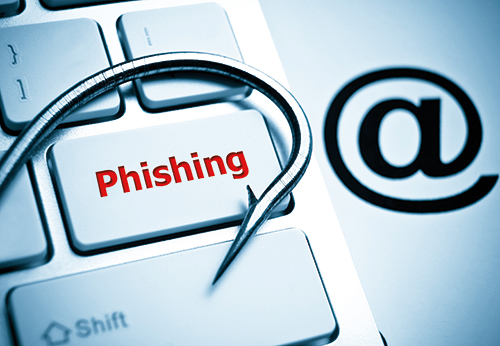
There has, however, been a huge upsurge in cyber crime, with scam e-mails and text messages designed to trick the recipient into handing over personal data. In general, we are now all spending more time online than ever before, which means that we are all more exposed to falling into these traps.
The National Cyber Security Centre has some tips relating to e-mail security:
- Create a separate password for your e-mail – use different passwords for all your accounts.
- Create a strong password using three random words – weak passwords can be hacked in seconds which gives the criminal the ability to manipulate your e-mails both incoming and outgoing.
- Save your password in your browser
- Turn on two-factor authentication
- Update your device
- Turn on backup
Phishing
Phishing is where criminals try to convince you to click on links within a scam e-mail or text message, or to give away sensitive information such as bank details. Once clicked you may be sent to a third-party website, which could download viruses onto your computer or steal your passwords, giving the criminal access to all of your personal/business information.
Given the current Covid-19 situation, cyber criminals are sending e-mails that claim to have a ‘cure’ for the virus, offer financial rewards or encourage you to donate. These messages are all preying on real-world concerns to try and trick you into clicking on the link. They can be very hard to spot, and are designed to get you to react without thinking.
Tips for spotting phishing
Spotting a phishing email is becoming increasingly difficult, and many scams will even trick computer experts. However, there are some common signs to look out for:
- Authority - Is the sender claiming to be from someone official (like your bank, doctor, a solicitor, government department) or even a supplier/customer of your business? Criminals often pretend to be important people or organisations to trick you into doing what they want.
- Urgency - Are you told you have a limited time to respond (like in 24 hours or immediately)? Criminals often threaten you with fines or other negative consequences.
- Emotion - Does the message make you panic, fearful, hopeful or curious? Criminals often use threatening language, make false claims of support, or tease you into wanting to find out more.
- Scarcity - Is the message offering something in short supply (like money or a cure for medical conditions)? Fear of missing out on a good deal or opportunity can make you respond quickly.
- Current events - Are you expecting to see a message like this? Criminals often exploit current news stories, big events or specific times of year (like tax reporting) to make their scam seem more relevant to you. An e-mail may look like it comes from a supplier and give a link to make a payment which you are expecting to make but it could have been hacked and re-directed to the criminal’s bank account.
Your bank, HMRC or any other official source should never ask you to supply personal information from an email. If you have any doubts about a message, call them directly. Don’t use the numbers/emails in the email but visit the official website instead.
If you are still unsure then please do give us a call and, finally, please pass on this information to family members and friends who may be vulnerable to attack in this way.
Jenny Rowe
May 2020
More News